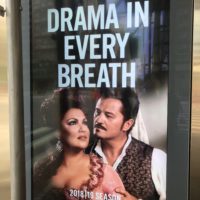I have a request from someone I know in classical music management. This friend has seen me make radical suggestions here, and wants me to make sure we all understand something — that these changes would be hard for big institutions to make. Of course I know that. The first thing any big classical music institution needs to do — a major orchestra, let’s say — is survive. To survive, it needs to keep doing what it’s always done. That’s what its current audience wants, and its current donors. Can’t do without those ticket sales, and those … [Read more...]
Yes, tattoos!
In a past post, I said that if we want classical musicians to look like their future young audience — or the audience we hope will be there in the future — a lot of these musicians will have to have tattoos. I didn’t quite put it that way. I was talking about a new young audience in Washington, DC. But I think it applies more or less everywhere. I also thought I was exaggerating. Meant tattoos to serve as only as a symbol of what younger people look like, the ways in which they’re different from the classical music norm. But I didn’t … [Read more...]
Just a thought
This comes from Ronald D. Moore, the showrunner — chief producer, chief writer, and overall conceiver — of the Battlestar Galactica TV series (not the original 1970s version, but the 2004 remake, surely the best science fiction TV show ever, and for my money one of the best TV shows of any kind). Moore said, early on (according to an oral history of the show), telling his team about an important sci-fi TV producer he’d worked with in the past: “Everything he says you have to do, we’re not going to do. And everything he says to never do, … [Read more...]
Classical music reborn
In my last post, I quoted an idealistic thought from Simon Rattle, that orchestra musicians should look like the people in the city around them. My point was to talk about how not very specific that thought was, how when we say things like that we don’t really define what we mean mean, or plan how we’d achieve such goals. And in passing, I said we weren’t likely to see what Rattle imagines until classical music becomes a truly contemporary art. But what would that mean? I put down a kind of IOU: And yes, I realize that what I’m saying … [Read more...]
Looking like the outside world
Simon Rattle wants the musicians in his orchestra to look like the city they come from. Or so I read some time ago in the Guardian. Since he’s now music director of the London Symphony, he’s saying that he wants the musicians in his orchestra to look like London. “Why do our groups of classical musicians not look like London looks,” he said, “and what can we do about it?” This sounds like a great goal. But it’s a heavy lift. Suppose I try the same thinking in the city I live in, Washington, DC. If the musicians in our orchestra, the National … [Read more...]
Unconvincing
If you've been reading me for any length of time, you know I think classical music needs to modernize itself. Not that a lot of people don’t think that these days, but I've been pushing the thought for quite a while. So you'd think I might love it when the Met Opera and the New York Philharmonic hyped their new seasons with these posters, done in the most up to date corporate marketing style: But I don’t love it. To me these posters don't, simply as advertising, do much to make their case. And they promise things that aren’t going … [Read more...]
Here’s a contrast
This is a new version of this post, revised to improve (I hope) the wording of one of my points, and to include more thoughts about Kate Bush. Uploaded on September 20. A contrast between the meaning of some classical pieces — as suggested by a group performing them — and what pop songs can mean. Here’s the classical statement: We offer our performances of quartets by Mendelssohn, Prokofiev, Golijov and Janáček as a message of hope because they illuminate the human potential to create beauty, even in the darkest of circumstances. This is … [Read more...]
A culture that supports creativity
Please note -- what you're reading now is a revised version of this post. The earlier version had a shorter description of what goes on at the Lawrence Conservatory, instead of the longer one that's here now. My bad. The post always should have had the longer one.) To follow my blog post last week about the start of my Juilliard course on how to speak and write about music… Conservatory education has been changing. Not everywhere, but in many places. New ideas, new thoughts about what education for classical musicians should be. What … [Read more...]
Juilliard — my 21st year
Hard to believe I’ve been teaching there that long! Starting in the spring of 1997, with the first edition of my flagship graduate course on the future of classical music. Or, as it’s called at the school, “Breaking Barriers: Classical Music in an Age of Pop.” In the fall, I teach “Speaking of Music: How to Talk and Write About It.” Beginning tomorrow, Wednesday, September 5. Here’s the course overview, and here’s the week by week class schedule, with links to all assignments. What we do in the course: work on describing music in words. … [Read more...]
More delight
In my last post, I called out with great delight a performance of Scheherazade, conducted by Leif Segerstam, in which Segerstam and the orchestra shouted at the climax. Exhilarating! I blogged about it, not to say that all orchestras should shout, but to show what can be done, to give an example of what orchestras could do, if they wanted to bring something new to their performances. So here are other examples Because of course Segerstam and the Sinfönia de Galicia (the terrific orchestra in this performance) aren’t the only ones in the … [Read more...]
Crazy delightful
One of my students emailed a link to something I loved, loved, loved. It was a performance of Scheherezade, conducted by the ineffable, absolutely unqiue and wonderful Leif Segerstam. At the climax of which — and I hope you’re ready for this! — Segerstam and the orchestra start shouting. About Segerstam… Segerstam facts, on Wikipedia. Piece on him from the Guardian, showing how unique — ineffable — he is (the composer of 319 symphonies, as of the day I’m posting this; only 251 when the Guardian piece came out). And here he is … [Read more...]
Losing its meaning
I don't want to say anything bad about the royal wedding, which was lovely and inspiring. Or about Sheku Kanneh-Mason, the cellist who played so gorgeously. But one of the pieces he played was crazily inappropriate. And surely it's amazing — a little bit wildly so — that no one planning the wedding seemed to know this. The inappropriate piece was an arrangement of the Fauré song "Après un rève." Go here for the French words and an English translation. You'll see that the song is not about happy love, which would have suited the … [Read more...]
Off the pedestal
Here’s a phrase from the biography of Beth Bahia Cohen, a violinist who plays our kind of classical music, but who also plays just about every violin-like instrument found anywhere in the world. And specializes in music from Hungary and Greece. She’s on the faculty at Berklee. Where, she says, she teaches Global Strings Ensembles, Greek Music Ensemble, and private lessons in world violin traditions including European classical music. So how about that! European classical music, positioned simply as one of many world traditions. Is … [Read more...]
Correcting myself
Sometimes I get things really wrong. As I did in my last post, when I quoted a tweet about Kendrick Lamar winning the Pulitzer Prize: Just help me come to grips with the fact that someone can be a good enough musician to win a Pulitzer Prize, but not qualified to gain entry into the undergraduate music ed program at my school. I more or less took for granted that this tweeter was attacking the award, saying that Lamar has no musical knowledge. I replied to that, as you can see in the post, saying that there were many kinds of musical … [Read more...]
Coming to grips
One objection to Kendrick Lamar winning the Pulitzer Prize went like this (from Twitter): Just help me come to grips with the fact that someone can be a good enough musician to win a Pulitzer Prize, but not qualified to gain entry into the undergraduate music ed program at my school. I'm just shaking my head at that. First, how does this person even know Lamar couldn't get into that program? Fascinating, maybe racist assumption -- that someone who does hiphop couldn’t have conventional musical chops. But way beyond that breathtaking … [Read more...]






